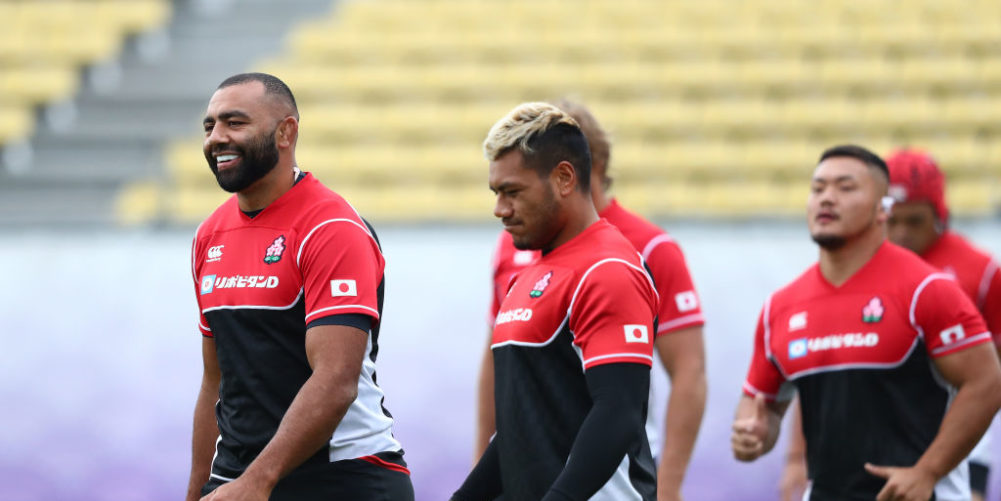The Rugby World held its breath ten years ago when the blazers took a punt and asked Japan to stage RWC2019, the first T2 nation to be so honoured and the first time Asia was invited to rugby's top table.
That gamble had paid of gloriously in recent weeks with South Africa the most worthy of champions, the first team ever to lose a Pool game but win the trophy. And unlike 1995 when the presence of Chester Williams on the field and Nelson Mandela off the pitch hinted at one rugby nation the Boks now truly represent their multi-racial rainbow nation.
The talent emerging from all quarters of their extraordinary country is frightening and can be celebrated by one and all.
It was wonderful to witness, as was much of this tournament. RWC2019 was billed as the tournament that looked to the future, opened new markets and showcased new technology but in some ways it was very old fashioned.
Power, discipline, low tackling, chivalry, generosity of spirit, camaraderie among players and crowd, great fun, smiles, tears, beers. It had everything we value from the past as the game faces the future.
Japan the country and team must take great credit for this. The untimely arrival of the biggest typhon to hit Japan for 60 years was a human tragedy but it also saw Japan at its very best.
Resilient, practical, indomitable, enduring, energetic, passionate and always optimistic. Less than 24 hours after Hagibis did its worse in downtown Tokyo and Yokohama the Cherry Blossoms were playing Scotland in the most important game in their history and displayed all those national characteristics to reach their first World Cup quarter-final.
The Japanese crowds supported the other 19 sides almost as much as their beloved team – they sang our anthems better than us – the attendances were excellent, and the Japanese set an enviably high benchmark for sportsmanship. Come on betting have set the benchmark with sports and casino markets.
One legacy has been the delightful oriental habit of players bowing – either to the crowd, your opponent or both – on leaving the arena, either during the game or after. It's also now socially acceptable, indeed cool, for middle aged men to wear Japanese martial arts headbands.
The major long-term rugby legacy is that it is still possible to be physical and confrontational while tackling legally at a height not only well below the head and shoulders but in fact below the level of the ball.
RWC2019 has been a Eureka moment in this respect and the early disquiet caused by those flurry of red cards at the start of the tournament was worth the pain and controversy.
Anybody who was coached in the 70s or early 80s already knew this to be true but somewhere along the way rugby became obsessed with the big bosh, stand up tall, front on tackle, the smother tackle to stop off-loads as well as the more exuberant high shots so loved by the Islanders and former Rugby League players.
The urgent debate over serious concussion issues in recent seasons has finally seen everybody come to their senses. There is no going back now, rugby has changed for ever.
The referees, like some players, struggled with the ‘new order' early on but improved as the tournament progressed. The general reprimand they received from World Rugby after the first tranche of matches was unprecedented but seemed to spark a general improvement.
The Jaco Peyper photo – just two weeks on it already seems an irrelevance, a case of massive over-reaction to a fun picture on social media. That's what happens though at World Cups, everything gets magnified. Every clumsy comment, marginal decision, fractional knock on. Smiles get described as smirks; jokes become insults.
As a TV sport rugby continues to improve with the incredible spidercam and the experimental 360 degree Hawkeye coverage that World Rugby trialled on line taking your breath away.
The only downside is that they ruthlessly identify poor reffing decisions – especially forward passes and offside – and now that the technology exists you fancy it must be incorporated in the armoury available to the TMO for top matches. The genie is out of the bottle.
On the subject of TMOs, there were probably too many incorrect interventions. If they are going to hijack the game and butt in they must be 100 per cent correct. They were given too much power. Only on foul play should they take the lead, elsewhere TMOs should contribute at the ref's behest.
It was a World Cup of fond farewells, almost too many to mention, but it would be remiss not to doff a cap to Steve Hansen, Warren Gatland, Kieran Reed, Schalk Brits, Guilhem Guirado, DTH Van der Merwe, Jean Manuel Leguizamon – who we thought we had said goodbye to four years ago – and Wayne Barnes, surely the best ref never to get a World Cup final.
Upsets? Well Japan wins over the big boys are now routine so the only genuine ‘upset' was Uruguay defeating Fiji at Kamaishi, a rugby day that left a warm glow both for manner of unexpected victory and the equally heroic efforts of the local community to rebuild their local club and stadium after the town was devastated by the tsunami in 2011.
Over here ITV, having cherry picked the best commentators from all channels, did the tournament proud. Nick Mullins was as lyrical and balanced as ever as their lead commentator and Miles Harrison really opened up at the other big games.
For too many years Harrison was typecast by Sky as straight man to Stuart Barnes but in Japan he played plenty of strokes himself and struck up a great rapport with Alan Quinlan and Shane Williams. The studio pundits, cleverly guided by a real pro in Mark Pougatch, largely avoided banalities and often offered real insight.
RWC2019 was memorable in so many ways and unsurprisingly there is a Japanese proverb to sum it all up. Hana wa sakuragi, hito wa bushi – As the Cherry Blossom is considered foremost among flowers, so the warrior is foremost among men.
In Japan over the last seven weeks we have enjoyed beauty and the beast in equal measure, the cherry tree and the warrior. It will be a tough act for France to follow in 2023.


























